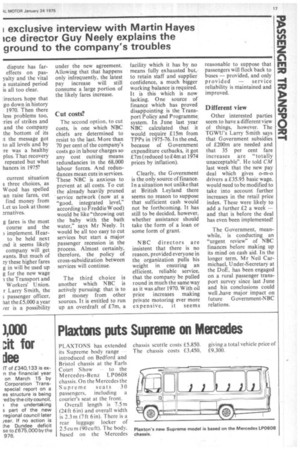exclusive interview with Martin Hayes ice director Guy Neely explains the ground to the company's troubles
Page 19

If you've noticed an error in this article please click here to report it so we can fix it.
dispute has fareffects on pasyalty and the vital a sustained period is all too clear.
.irectors. hope that go down in history 1970. Then there less problems too, tries of strikes and and the company the bottom of its It the message got to all levels and by :re was a healthy plus. That recovery repeated but what hances in 1975?
current situation s three choices, as Wood has spelled :an raise fares, cut find money from Let us look at those .trnatives.
g fares is the most course and the ) implement. H ear to be held next ind it seems likely company will get Nants. But much of these higher fares g in will be used up g for the new wage .1 the Transport and Workers' Union. r Larry Smith, the passenger officer, hat the £5,000 a year ier is a possibility under the new agreement. Allowing that that happens only infrequently, the latest pay increase will still consume a large portion of the likely fares increase.
Cut COSte The second option, to cut costs, is one which NBC chiefs are determined to resist to the last. More than 70 per cent of the company's costs go in labour charges so any cost cutting means redundancies in the 68,000 labour forces. And redundances mean cuts in services. These NBC is anxious to prevent at all costs. To cut the already heavily pruned service network (now at a "good, integrated level," according to Freddie Wood) would be like "throwing out the baby with the bath water," says Mr Neely. It would be all too easy to cut services but start a major passenger recession in the process. Almost certainly, therefore, the policy of cross-subsidization between services will continue.
The third choice is another which NBC is actively pursuing that is to get money from other sources. It is entitled to run up an overdraft of £7m, a facility which it has by no means fully exhausted but,• to retain staff and supplier confidence, a much bigger working balance is required. It is this which is now lacking. One source of finance which has proved disappointing is the Transport Policy and Programme, system. In June last year NBC calculated that it would require £15m from TPPs in 1975-76. In the end, because of Government expenditure cutbacks, it got £7m (reduced to £4m at 1974 prices by inflation).
Clearly, the Government is the only source of finance. In a situation not unlike that at British Leyland there seems no reason to suppose that sufficient cash would not be forthcoming. It has still to be decided, however, whether assistance should take the form of a loan or some form of grant.
NBC directors are insistent that there is no reason, provided everyone in the organization pulls his weight in ensuring an efficient, reliable service, that the company be pulled round in much the same way as it was after 1970. With oil price increases making private motoring ever more expensive, it seems reasonable to suppose that passengers will flock back to buses — provided, and only provided — service reliability is maintained and improved.
Different view
Other interested parties seem to have a different view of things, however. The TGWU's Larry Smith says that Government subsidies of £200m are needed and that 35 per cent fare increases are "totally unacceptable". He told CM last week that the new pay deal which gives o-m-o drivers a £35.95 basic wage, would need to be modified to take into account further increases in the retail price index. These were likely to add a further £2 a week — and that is before the deal has even been implemented!
The Government, meanwhile, is conducting an "urgent review" of NBC finances before making up its mind on cash aid. In the longer term, Mr Neil Carmichael, Under-Secretary at the DoE, has been engaged on a rural passenger transport survey since last June and his conclusions could well ,have major impact on future Government-NBC relations.




































































































